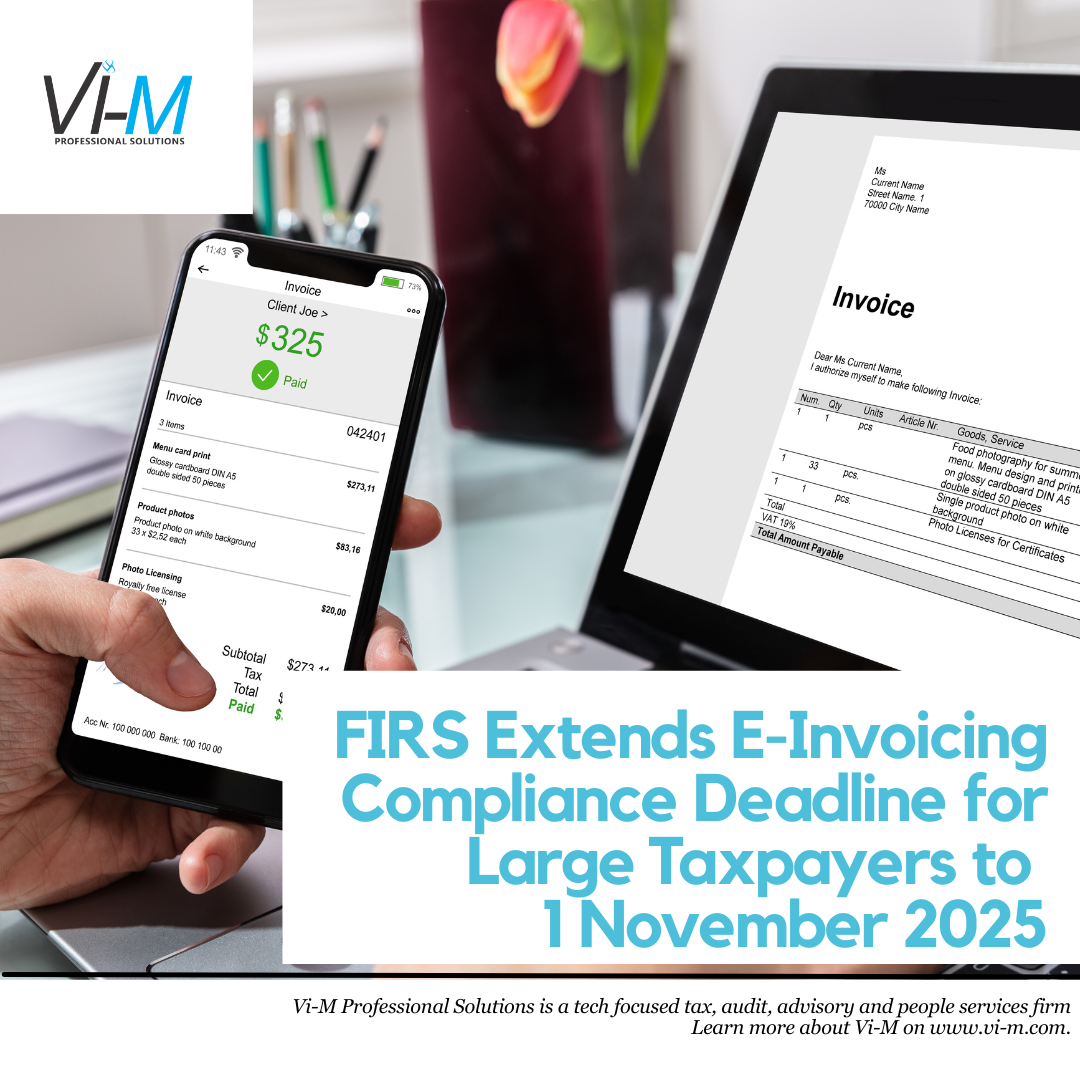The Federal Inland Revenue Service (FIRS) has announced a three (3) month extension — moving the mandatory go-live/enforcement date from 1 August to 1 November 2025 — for onboarding and commencing real-time transmission of electronic invoices under the National E-Invoicing & Electronic Fiscal System (EFS), also known as the Merchant-Buyer Solution (MBS). The extension applies to Large Taxpayers (those with filed income tax returns reflecting annual turnover of ₦5 billion and above).
Two recent public notices (click here and here to download them) from the FIRS reinforce its focus on mandatory adoption, tight timelines, and non-compliance penalties. This is a clear signal to large taxpayers: E-invoicing is no longer optional — and the window for slow adoption has closed.
The FIRS’ E-Invoicing Initiative
Since November 2024, the FIRS has been working to formally launch a national e-invoicing regime under the EFS. The e-invoicing system (MBS) aims to modernize how businesses report and transmit invoices, driving transparency and efficiency in tax administration. This reform represents one of the most significant shifts in Nigeria’s tax system and is part of the Federal Government’s broader agenda to digitize tax processes and reduce revenue leakages. (See our previous newsletter for background on this initiative.)
Expectation for Mandatory Nationwide Adoption
At present, the rollout targets only large taxpayers — i.e., businesses with turnover of ₦5 billion and above. However, under the 2025 Nigeria Tax Administration Act and the Nigeria Tax Act, adoption is expected to become mandatory for all taxable persons in Nigeria from 1 January 2026. From that date, every business, regardless of size, is expected to fiscalise transactions through an FIRS or Nigeria Revenue Service-approved platform.
In practice, all invoices issued in Nigeria will need to be:
- Electronically generated,
- Validated by the tax authority, and
- Stamped or encoded with a QR code for authenticity.
This marks the end of paper-based invoicing for VAT-registered businesses.
Extension of Deadline
Although the platform successfully went live in August 2025 after its pilot phase, many large taxpayers experienced challenges meeting the initial onboarding requirements. These included technical integration issues, the need for staff training, and operational constraints. To encourage voluntary compliance rather than impose penalties, the FIRS has granted a three-month extension to 1 November 2025.
It is worth noting that, beyond accommodating genuine compliance challenges, the FIRS appears to be using these phased deadlines as a tactical strategy. By gradually extending timelines, the Service is effectively preparing taxpayers, gauging reactions, and reinforcing awareness—ensuring that by 1 January 2026, all large taxpayers, and eventually all taxable persons, are fully onboard with e-invoicing.
What This Means for You
All eligible Large Taxpayers must, on or before 1 November 2025:
- Register and onboard to the FIRS e-invoicing platform.
- Integrate their invoicing/ERP systems with the FIRS Merchant-Buyer Solution.
- Commence real-time generation, validation, and transmission of invoices through approved e-invoicing channels.
From January 2026, this obligation will extend to all taxable persons in Nigeria.
Where Vi-M Comes In
While Vi-M Professional Solutions finalizes its FIRS-accredited middleware, we are already assisting clients by:
- Project Managing FIRS Integrations — Overseeing ERP/accounting software connections to FIRS via approved channels.
- Schema Compliance Reviews — Ensuring invoice formats, VAT categorization for items for sale/ supplies, data fields, and processes align with the FIRS e-invoicing schema.
- Change Management & Training — Preparing finance, tax, and sales teams to issue, validate, and reconcile e-invoices without disruption.
- Vendor & Tech Liaison — Coordinating between your IT team, ERP vendors, and FIRS’ technical or Access Point Provider (APP) team.
- Access Point Provider (APP) Advisory — Reviewing transaction volumes, industry specifics, and systems to recommend the most cost-efficient and reliable FIRS-accredited APP.
- System Integration with Tax Expertise — Unlike most APPs that focus only on technical connection, Vi-M combines integration with deep tax law and compliance expertise. This ensures setups are not only functional but also strategically compliant, tax-optimized, and audit-ready.
Act Now
If your business turnover meets or exceeds ₦5 billion, you are already on FIRS’ compliance radar. Early engagement reduces risk exposure and helps avoid costly last-minute errors.
For assistance with integration to the FIRS MBS, or enquiries on how this reform affects your business, contact us at clients@vi-m.com.

